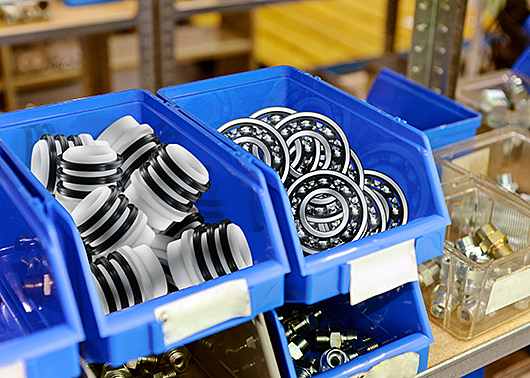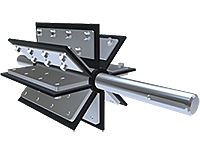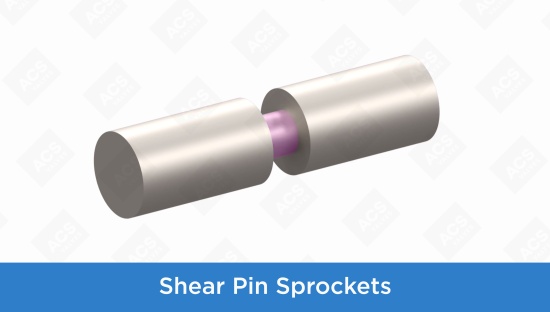
Looking back, the past few years might seem like a roller-coaster for manufacturers — one full of supply chain issues, workforce shortages, and surprise tariffs instead of fun loop-de-loops.
Take a moment to pat yourself on the back. We manufacturers are a resilient bunch, and while we can’t plan for every contingency, we always do our best to prepare for the unexpected.
That’s where spare parts come in handy. With all the moving parts involved in a bulk material processing system, any number of things can go wrong — parts wear out, ingredients get jammed, spaghetti goes flying everywhere… It’s all part of the job.
Which parts should you keep on hand?
Because you never know what’s next, we recommend clearing off a shelf for these rotary airlock valve parts:
- One spare rotor
- Two bearings
- Two shaft seals
- Shaft seal packing (if your valve uses packing glands)
- A pack of ten shear pins (if your valve has shear pin sprockets)
- One spare motor
When it comes to conveying equipment in general, we also suggest keeping spare inlet filters for blowers, filter bags or cartridges for your dust collector, conveying long radius elbows, and motors and gearmotors for other machinery. There’s probably more, but these are the common culprits for faster wear-and-tear.
3 good reasons to keep spare parts
1) Avoid damage to other parts
Many rotary valve parts rely on others to function properly. If you leave one faulty part in the system for too long, it can cause a domino effect that wears down other components.
For example, if a shaft seal gets too worn out, material passing through the valve will start to contaminate the bearings. This can cause a perfectly good bearing to fail, and when that happens, the entire piece of equipment will eventually seize up and stop working. This is true for valves and other machinery that relies on bearings to work, such as screw conveyors.
Keeping a stock of spare parts means you can immediately lock out the system and swap in a new shaft seal or bearing as needed, with no dominoes in sight.
2) Prevent downtime
We don’t need to tell you that a cascade of broken parts and equipment can add a ton of unnecessary downtime spent on repairs and maintenance.
That’s a more serious scenario, but more commonly worn-out parts can add time spent troubleshooting issues with material flow and jamming. We sometimes hear about processors spending time trying to knock material loose when they could simply swap out the affected part and get your equipment working again.
If you wait until a part fails to order a new one, you’ll also need to factor in the time spent waiting for your order to arrive. That could mean days or weeks of downtime, depending on your supplier, before you can get that system back up and running.
3) Stay safe and compliant
Spare parts can save you time, money, and a whole lot of hassle, but they’re also essential for keeping your facility safe and compliant with safety regulations.
Your valve’s rotor is one of the most vital aspects of NFPA compliance, because rotor-to-housing tolerances need to stay under 0.0079’’ to prevent combustible dust from escaping your system. Dust leakage is a potential fuel source for fires, flash fires, and explosions, so you’ll want to make sure rotors, bearings, and shaft seals are always in working order.
We highly recommend keeping a historical maintenance log and checking your rotor-to-housing tolerances on a regular basis. If the tolerances get too large, you should swap out the rotor as soon as possible to stay compliant. We have a handy NFPA kit you can order to ensure you always have a healthy stock of these critical parts.
Bonus tip: Don’t waste material
We mentioned that material leakage is a common symptom of worn-out parts. Aside from the safety hazard that presents, it’s causing you to lose valuable product that would otherwise stay contained in your system. Keeping a stock of spare parts is a cost-efficient move for all these reasons.
Ready to order?
The experts at ACS Valves can recommend which spare parts would be most useful, and how many you need, based on your valve and application. Call us to order yours today.


